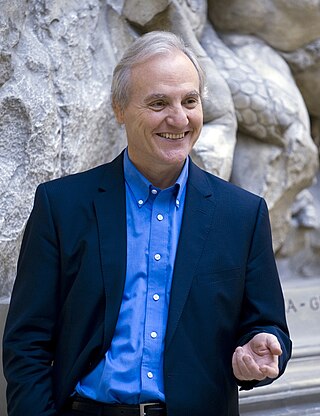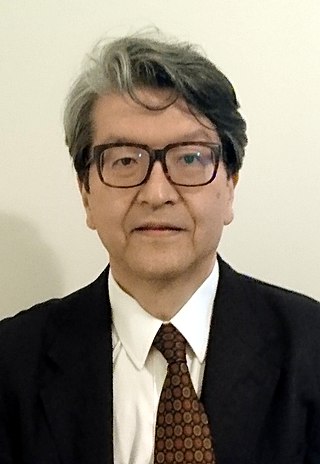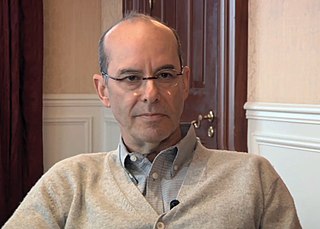Related Research Articles
The Austrian School is a heterodox school of economic thought that advocates strict adherence to methodological individualism, the concept that social phenomena result primarily from the motivations and actions of individuals and their self interest. Austrian school theorists hold that economic theory should be exclusively derived from basic principles of human action.
Game theory is the study of mathematical models of strategic interactions among rational agents. It has applications in many fields of social science, used extensively in economics as well as in logic, systems science and computer science. Initially game theory addressed two-person zero-sum games, in which a participant's gains or losses are exactly balanced by the losses and gains of the other participant. In the 1950’s it was extended to the study of non zero-sum games and was eventually game applied to a wide range of behavioral relations, and is now an umbrella term for the science of rational decision making in humans, animals, as well as computers.
An economist is a professional and practitioner in the social science discipline of economics.
Evolutionary economics is a school of economic thought that is inspired by evolutionary biology. Although not defined by a strict set of principles and uniting various approaches, it treats economic development as a process rather than an equilibrium and emphasizes change, innovation, complex interdependencies, self-evolving systems, and limited rationality as the drivers of economic evolution. The support for the evolutionary approach to economics in recent decades seems to have initially emerged as a criticism of the mainstream neoclassical economics, but by the beginning of the 21st century it had become part of the economic mainstream itself.
Behavioral economics is the study of the psychological, cognitive, emotional, cultural and social factors involved in the decisions of individuals or institutions, and how these decisions deviate from those implied by classical economic theory.

Cliometrics, sometimes called 'new economic history' or 'econometric history', is the systematic application of economic theory, econometric techniques, and other formal or mathematical methods to the study of history. It is a quantitative approach to economic history.
Institutional economics focuses on understanding the role of the evolutionary process and the role of institutions in shaping economic behavior. Its original focus lay in Thorstein Veblen's instinct-oriented dichotomy between technology on the one side and the "ceremonial" sphere of society on the other. Its name and core elements trace back to a 1919 American Economic Review article by Walton H. Hamilton. Institutional economics emphasizes a broader study of institutions and views markets as a result of the complex interaction of these various institutions. The earlier tradition continues today as a leading heterodox approach to economics.

Heterodox economics is any economic thought or theory that contrasts with orthodox schools of economic thought, or that may be beyond neoclassical economics. These include institutional, evolutionary, feminist, social, post-Keynesian, ecological, Austrian, humanistic, complexity, Marxian, socialist, anarchist and modern monetary theory economics.

Geoffrey Martin Hodgson is Emeritus Professor in Management at the London campus of Loughborough University, and also the editor-in-chief of the Journal of Institutional Economics.

Kenneth George "Ken" Binmore, is an English mathematician, economist, and game theorist, a Professor Emeritus of Economics at University College London (UCL) and a Visiting Emeritus Professor of Economics at the University of Bristol. As a founder of modern economic theory of bargaining, he made important contributions to the foundations of game theory, experimental economics, evolutionary game theory and analytical philosophy. He took up economics after holding the Chair of Mathematics at the London School of Economics. The switch has put him at the forefront of developments in game theory. His other interests include political and moral philosophy, decision theory, and statistics. He has written over 100 scholarly papers and 14 books.

Ernst Fehr is an Austrian-Swiss behavioral economist and neuroeconomist and a Professor of Microeconomics and Experimental Economic Research, as well as the vice chairman of the Department of Economics at the University of Zürich, Switzerland. His research covers the areas of the evolution of human cooperation and sociality, in particular fairness, reciprocity and bounded rationality.

Michael Robert Kremer is an American development economist currently serving as University Professor in Economics at the University of Chicago and Director of the Development Innovation Lab at the Becker Friedman Institute for Research in Economics. Kremer formerly served as the Gates Professor of Developing Societies at Harvard University, a role he held from 2003 to 2020. In 2019, Kremer was jointly awarded the Nobel Memorial Prize in Economic Sciences, together with Esther Duflo and Abhijit Banerjee, "for their experimental approach to alleviating global poverty."
Paul Montgomery Bingham is an American molecular biologist and evolutionary biologist, Associate Professor in the Department of Biochemistry and Cell Biology at Stony Brook University and Vice President for Research at Rafael Pharmaceuticals. He is known for his work in molecular biology, and has also published recent articles and a book on human evolution.

The European Association for Evolutionary Political Economy (EAEPE) is a pluralist forum of social scientists that brings together institutional and evolutionary economists broadly defined. EAEPE members are scholars working on realistic approaches to economic theory and economic policy. With a membership of about 500, EAEPE is now the foremost European association for heterodox economists and the second-largest association for economists in Europe.

Katsuhito Iwai is a Japanese economist and critic. He has studied the theory of money, macro dynamics, evolutionary economics, philosophy of corporations, fiduciary law, and the history of sociology. His work includes the book, Disequilibrium Dynamics, and many articles published in academic journals. He has also written books and articles in newspapers and magazines for the general public on a wide variety of subjects ranging from global capitalism, post-modernity, civil society, money and language to literature and movies. His keen observations and analysis of the works of Shakespeare, Marx, J. S. G. Boggs, and Ihara Saikaku have established him as one of the foremost essayists in Japan.
Arthur S. De Vany is an American economist who has studied the Hollywood film industry and developed theories of evolutionary fitness focusing on nutrition and exercise in the paleo (caveman) manner. He is Professor Emeritus of Economics at the University of California, Irvine.

Joseph Henrich is an American professor of human evolutionary biology at Harvard University. Before arriving at Harvard, Henrich was a professor of psychology and economics at the University of British Columbia. He is interested in the question of how humans evolved from "being a relatively unremarkable primate a few million years ago to the most successful species on the globe", and how culture shaped our species' genetic evolution.
Teppo Felin is the Douglas D. Anderson Professor of Strategy & Entrepreneurship at the Huntsman School of Business at Utah State University. He is also the Founding Director of the Institute for Interdisciplinary Study. From 2013 to 2021, Felin was Professor of Strategy at the Saïd Business School at the University of Oxford. His current research focuses on cognition, rationality, perception, organizational economics, markets and strategy.

Barry Robert Weingast is an American political scientist and economist, who is currently the Ward C. Krebs Family Professor at Stanford University and a Senior Fellow at the Hoover Institution. Weingast's research concentrates on the relationship between politics and economics, particularly economic reform, regulation, and the political foundation of markets.
The "visible hand" is an economic concept describes the replacement of the regulatory function of the market mechanism by government intervention. Simply put, it refers to government intervention.
References
- ↑ Rowley, Charles (2008). The Encyclopedia of Public Choice. Springer Science & Business Media. p. 388. ISBN 9780306478284.
- ↑ "Paul H. Rubin". The Independent Institute. Retrieved 15 April 2016.
- ↑ WorldCat item entry
- 1 2 "Paul H. Rubin Curriculum Vitae" (PDF). Retrieved 20 February 2016.
- ↑ Felcher, Marla (November–December 1998). "Silent Recall". Mother Jones. Retrieved 21 February 2016.
- ↑ Dezhbakhsh, H. (1 August 2003). "Does Capital Punishment Have a Deterrent Effect? New Evidence from Postmoratorium Panel Data" (PDF). American Law and Economics Association. 5 (2): 344–376. doi:10.1093/aler/ahg021.
- ↑ Alfano, Sean (11 June 2007). "Death Penalty Deters Murders, Studies Say". CBS News. Retrieved 29 June 2016.
- ↑ "Paul Rubin". Emory University. Retrieved 20 February 2016.
- ↑ Carnahan, Ira (18 August 2004). "Uncle Sam's Malpractice". Forbes. Retrieved 21 February 2016.
- ↑ Aquino, John T. (19 March 2015). "Antibiotics Development Down, Congress, FDA Catch Up". Bloomberg BNA. Retrieved 21 February 2016.
- ↑ Tuschman, Avi (15 September 2015). "Inside the conservative brain: What explains their wiring?". Salon. Retrieved 21 February 2016.
- ↑ WorldCat book record